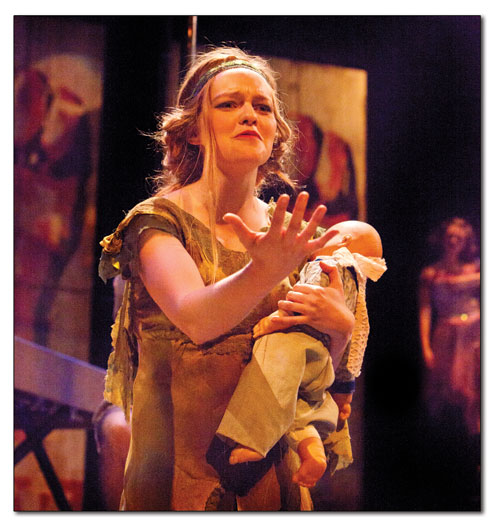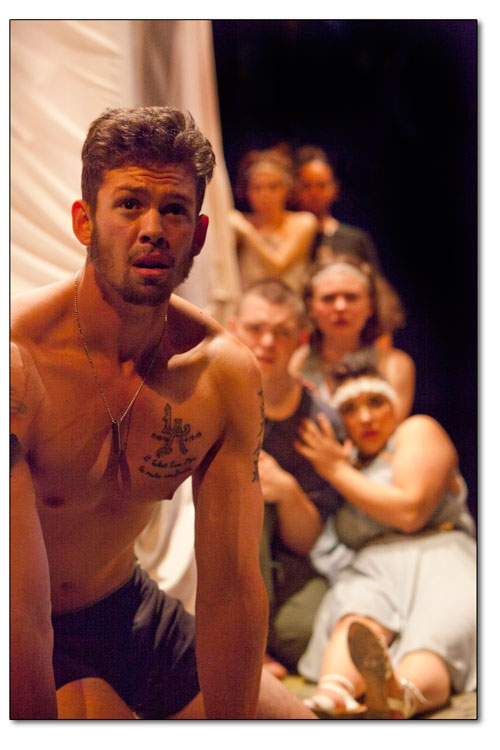

Camille Libouban-Gunderson, as Cassandra, in a scene from FLC’s production of “Trojan Women.” Based on Euripides’ classic tragedy, the play runs through Saturday./Photo by Jonas Grushkin
Love & war
FLC presents modern spin on Greek tragedy
by Stew Mosberg
Euripides’ ancient play “The Trojan Women” has been performed innumerable times in many different languages and has also spawned two major motion pictures. Sadly, as a result of its tragic subject matter, the play is as relevant to today’s headlines and global strife as it was in the Greek bard’s day.
Just the factsWhat: “Trojan Women: A Love Story,” a play by Charles Mee based on the Euripides original” |
Playwright Charles Mee’s adaptation of the 415 B.C. classic, combined with Hector Berlioz’ opera “Les Troyens,” reflects the more than 2,000 years of horrific atrocities humans continue to perpetuate. Historically, Euripides wrote his play after an Athenian army decimated a tiny island, killing all of the men and forcing women and children into slavery. Mee closely follows that story line but uses contemporary language while keeping the original character’s names. Infused with anachronistic songs and choreography, the production provides an outstanding opportunity for the Fort Lewis College Theater Department to explore, experiment and excel.
“We needed to do a contemporary piece that stretched us and (also) because of our dedication to providing students with innovative, new and devised theatre opportunities,” Theater Department Chairman Dennis Elkins explained. “(The Mee drama) actually demands the director, designers and cast must explore performance on a whole new level.”
Elkins tapped Melissa Firlit to tackle the job of guest director for the 2016-17 season. Firlit is a seasoned thespian and has been active in the New York theater world for the past 12 years. Her credentials and educational background are exemplary including theater studies in England and Russia. In fact, she herself acted in a different version of Mee’s play at the O’Neill National Theatre Institute in 2004.
As a playwright, Mee gives directors a great deal of latitude in staging the production, and Firlit took full advantage. “Mee asks you to cast as you see fit and make it a larger group, if you want,” she said. “He recommends at least 13 people. I wanted to go big for the space and the piece, hence the cast of 26.”
That number, as daunting as it might sound, works particularly well on the FLC theater stage, lending a sense of chaos and confusion in the aftermath of a sacked, war-ravaged city. The opening scene is dark and smoke filled, with sporadic retorts of gunfire in the background, lamenting women, strewn bodies and marauding soldiers. The set and lighting by Matthew McCarren is stark, gloomy and multi-leveled, the latter of which provides launching platforms for the very physical first act.
Other than deciphering the hard-to-pronounce character’s names, knowledge of Greek mythology isn’t a prerequisite for following the action, but it might help. The narrative takes place at the end of a war perpetuated by King Menelaus, played by Evan Pappan, after his wife Helen runs off; the role of Helen is portrayed by Erin O’Conner with temptress sexuality. The Trojan women hold Helen responsible for having caused the war which, in a way, she has.
Central to the play is the dethroned Queen Hecuba (Jessica Fairchild), who is the mother of Andromache (Molly Quinn) and Cassandra (Camille Libouban-Gunderson), whose baby is snatched from her arms and killed.
In act one, the conquering soldiers ransack the town, rape, beat and enslave the women and kill the men and male children. Powerless against the occupying army, the Trojan women anguish in the aftermath of the carnage. The refrain, “These are how men are,” implies the vast differences between nurturing women and the men who go to battle over a woman and then condone torturing them.
Talthybius, officiously portrayed by Luke McCauley, delivers the message that the women will be given away to the conquerors yet still utters the poignant statement, “In a war there are no victors!” He further pronounces that Hecuba’s eldest daughter, Cassandra, will become the concubine of Agamemnon, general of the vanquishing army.
Act one ends when Aeneas (Austin Minard) is brought before Hecuba and given an ultimatum. Among the fallen, he alone was spared by the gods, and Hecuba orders him to find a place to rebuild and create a utopia to avenge the destruction of Troy.
As such, act two opens on an idyllic note, as women giggle and frolic with consorts. The stage is draped in white fabric that ultimately becomes an integral part of the performance; at times shielding sexual encounters and also providing gentle bonds to envelop the lovers.
 Austin Minard as Aeneas, during dress rehearsal. The gods spared his life, but not his arm. He brokehis arm before opening night but pulled through with aplomb – sling and all./Photo by Jonas Grushkin |
The scene begins to turn from joy to anger and results in a murder that is harrowing in its portrayal. (In a side note, Minard [Aeneas] wears an arm sling on stage, which it turns out was not part of the original costume. He broke his arm the day before opening night making his very physical performance all the more remarkable. The show must and did go on. Kudos to you, Mr. Minard!)
Mee’s script doesn’t shy away from using explicit language, and act two is rampant with repeated references to sex acts and genitals that might offend some of the audience while titillating others. If it isn’t obvious by now, the content and staging of this play and the sex, profane language and brutality may not be appropriate for younger audiences.
Costuming by Kate Mathis is a mixture of grunge and punk street clothing that adds a contemporary flare to the defiant stance of the women who hope for the feminine utopia. The interjection of contemporary music is at first startling but ultimately helps break up the dismal, frighteningly bleak happenings on stage. Firlit also created some high-powered choreography but acknowledged giving the cast a big part in choosing the songs, yet again demonstrating her innovative training and education process.
Jessica Fairchild, a graduate of the FLC theater program, auditioned for the show just for the chance to work with Firlit; she was given the plum role of Hecuba and nails it. “The most challenging aspect of this experience is probably being put through an emotional ringer. Hecuba goes from being a queen, with her family and lifestyle secure, to hitting rock bottom,” Fairchild said. “That’s where she starts the play and then quickly discovers there are many different levels to rock bottom.”
As for the plotline and its emotional impact, Fairchild admitted the story is not an easy one to tell or an easy one to hear as an audience. “But it is important, it is real, it is an authentic perspective that asks difficult questions,” she said.
The additional accomplished cast include: Ashley Hunt as Polyxena; Leah Brewer as Queen Dido (lover of Aeneas); and KC Caimi as Valerie. In addition to these key characters there is an entire ensemble of male and female actors who perform with great enthusiasm and strength.
Also worth noting is that at 6 p.m. tonight, Thurs., April 7, there will be a reception in the theatre lobby for highly acclaimed watercolorist Ann Smith. A portion of sales of her paintings will be donated to the Theater Department.
In this week's issue...
- December 18, 2025
- Let it snow
Although ski areas across the West have taken a hit, there’s still hope
- December 18, 2025
- Look, but don't take
Lessons in pottery theft – and remorse – from SW Colorado
- December 11, 2025
- Big plans
Whole Foods, 270 apartments could be coming to Durango Mall parcel
